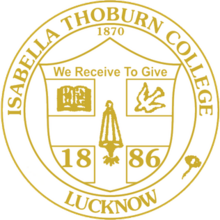Loading AI tools
Indian women's college From Wikipedia, the free encyclopedia
The Isabella Thoburn College (formerly the Lucknow Women's College and often called informally IT College) is a private multidisciplinary (humanities, social sciences, sciences, commerce, management and engineering) college for women in Lucknow, India, named after its founder, Isabella Thoburn, the first woman American missionary of the Methodist Episcopal Church to sail in India 1869. The college was established in 1870 with just six girls on roll. This college has 2 units, one degree college (humanities, social sciences, commerce and sciences) section affiliated with University of Lucknow and one professional studies (management and engineering) section affiliated with Dr. A.P.J. Abdul Kalam Technical University.
Former name | Lucknow Women's College |
|---|---|
Motto in English | "We receive to give" |
| Established | 18 April 1870 |
| Founder | Isabella Thoburn |
| Affiliation | University of Lucknow & Dr. A.P.J. Abdul Kalam Technical University |
| Location | , , 226007 , 26°52′18″N 80°56′32″E |
| Campus | Urban |
| Colors | Gold and White |
| Website | itcollege |
 | |
The IT Chauraha Metro Station is named after the college and lies next to it, connecting it with the Red Line.
The origin of the college was in a school for girls opened by Isabella Thoburn on 18 April 1870 in one room in Aminabad bazaar of Lucknow. There were then just six girls. By 1871, the school had expanded and moved to occupy a house named Lal Bagh, which had been lived in by the treasurer of the last Nawab of Awadh.[1][2]
On 12 July 1886 Miss Thoburn's school was renamed as the Lucknow Women's College and began to teach Fine Arts classes under the supervision of the University of Calcutta. In 1894, this connection was abandoned in favour of a new one with Allahabad University. Following the death of Miss Thoburn in 1901, the college, still at Lal Bagh, was given its present name in her honour. In 1923, it moved to the Chand Bagh estate of almost 32 acres, where it has remained until the present day.[1] Chand Bagh means "moon garden". The property was once a royal garden.[3] After its affiliation to Lucknow University it found requisite support and guidance from Nirmal Chandra Chaturvedi, a renowned educationist and member of the university Executive Council.
The college's Principal Sarah Chakko (1905–1954) was the first woman president of the World Council of Churches.

The college is now affiliated to Dr. A.P.J. Abdul Kalam Technical University for engineering and management courses and for all other courses it is affiliated to the University of Lucknow. The buildings it has developed on the Chand Bagh campus since the 1920s include student hostels, lecture rooms, laboratories, a library, a college chapel and an auditorium.[1] The college teaches seven undergraduate courses, leading to the degrees of Bachelor of Technology (BTech), Bachelor of Arts (BA), Bachelor of Education (BEd), Bachelor of Science (BSc), Bachelor of Commerce (BCom), Bachelor of Business Administration (BBA) and Bachelor of Library and Information Science (BLISc). There are also postgraduate courses leading to the degrees of Master of Arts (MA), Master of Science(MSc), Master of Business Administration (MBA) and a Postgraduate Diploma in Healthcare and Hospital Management (PGDHHM).[4][5]
Isabella Thoburn College, along with undergraduate and post graduate courses also offered intermediate classes. Eventually a separate college for intermediate level students was formed within the Isabella Thoburn College campus. This building only houses classes 11th and 12th, while the college level students study in the old college building.[6]
Isabella Thoburn College has hostel facilities for students as well as has a large number of day scholars. There are three hostels for the resident students, Naunihal, Nishat Mahal and Maitreyi Bhawan.[citation needed]
On 12 April 2012, the Government of India issued a new five rupee postage stamp illustrating the college.[7]
Value-based education emphasizes the importance of spirituality in shaping moral behavior. Incorporating religious studies in the education system helps guide students toward spirituality, which is associated with qualities like love, honesty, and humility. Chapel worship services, held regularly in college chapels and auditoriums, focus on Biblical teachings and values such as honesty, respect, self-discipline, kindness, and forgiveness, promoting character development among students.
This section needs additional citations for verification. (April 2021) |
Seamless Wikipedia browsing. On steroids.
Every time you click a link to Wikipedia, Wiktionary or Wikiquote in your browser's search results, it will show the modern Wikiwand interface.
Wikiwand extension is a five stars, simple, with minimum permission required to keep your browsing private, safe and transparent.